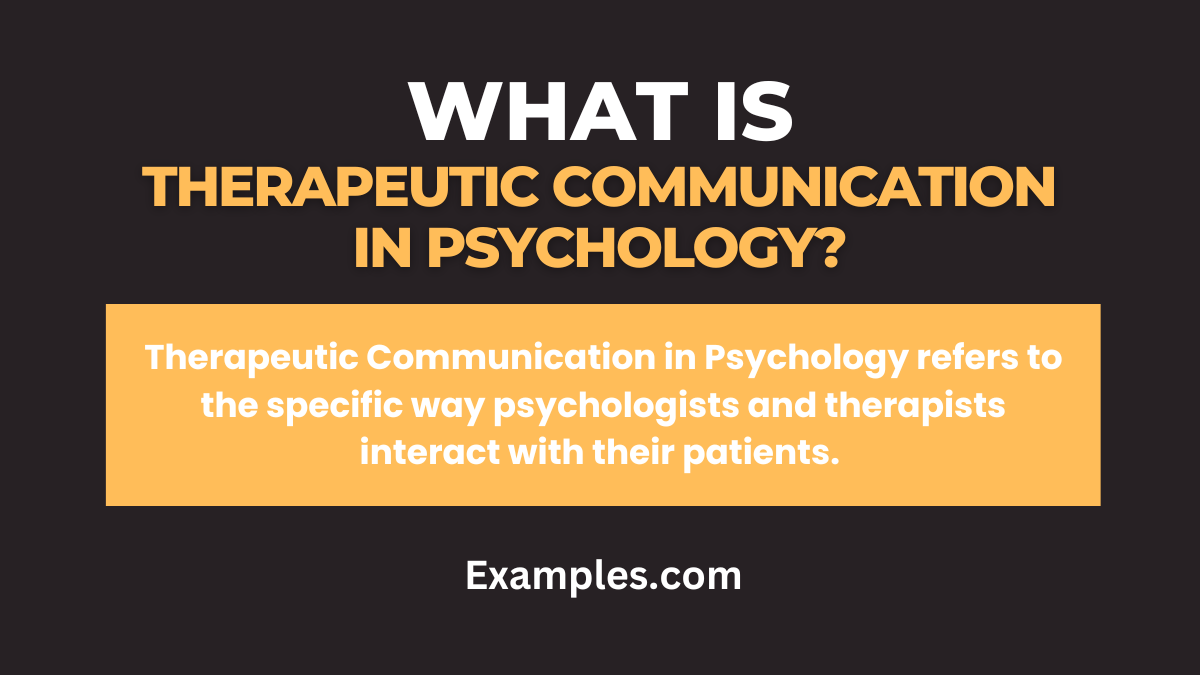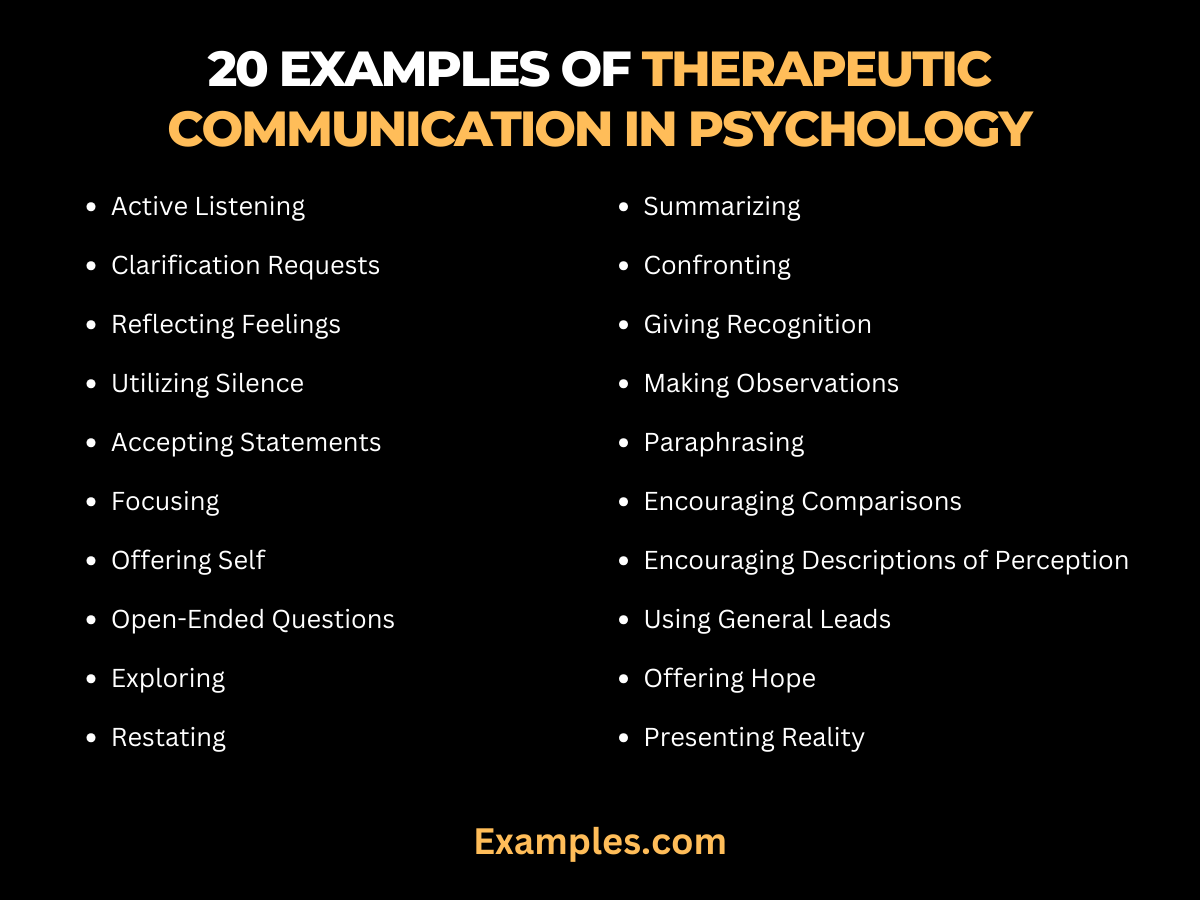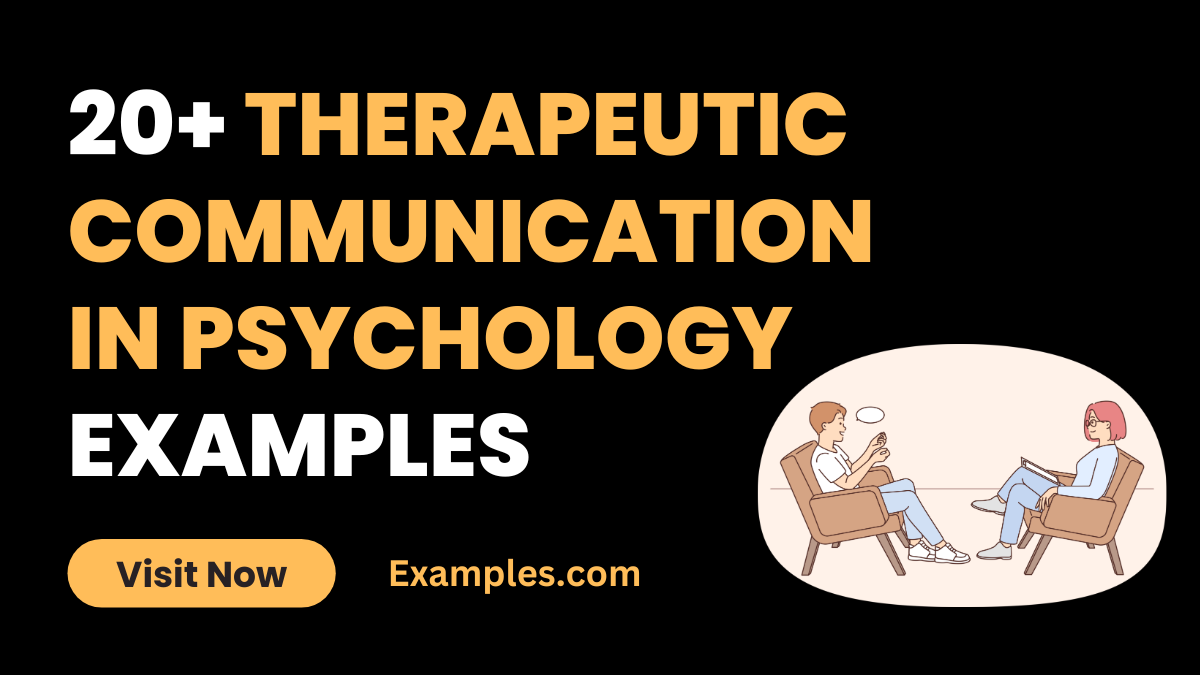19+ Therapeutic Communication in Psychology Examples
What is Therapeutic Communication in Psychology?

Therapeutic Communication in Psychology refers to the specific way psychologists and therapists interact with their patients. It involves using certain techniques and strategies to encourage patients to express their thoughts and feelings. This type of communication is focused on building trust, understanding, and empathy, enabling patients to feel comfortable and supported during their therapy sessions. The goal is to help individuals work through their issues by fostering a safe and open environment for dialogue.
20 Examples of Therapeutic Communication in Psychology
Delve into the world of Therapeutic Communication in Psychology with our insightful guide featuring 20 distinct and impactful examples. This content is designed for psychologists, counselors, and healthcare professionals. Each example is accompanied by a concise explanation, demonstrating how therapeutic communication can be effectively utilized in various psychological contexts. From building rapport to addressing complex emotional issues, these examples cover a broad spectrum of therapeutic interactions, providing valuable insights into the art of empathetic, supportive, and effective communication in mental health settings.
- Active Listening: Demonstrate full attention to the client’s words, using non-verbal cues to show engagement. This builds trust and encourages open sharing.
- Clarification Requests: Ask for clarification to ensure understanding, showing that you value the client’s perspective.
- Reflecting Feelings: Echo the emotions expressed by the client to validate their feelings and deepen understanding.
- Utilizing Silence: Employ strategic pauses to allow clients to process and express their thoughts more deeply.
- Accepting Statements: Show acceptance and non-judgment to create a safe and supportive environment.
- Focusing: Guide the conversation to help clients concentrate on key issues affecting their wellbeing.
- Offering Self: Share appropriate personal experiences to build rapport and empathy.
- Open-Ended Questions: Ask questions that encourage detailed responses, facilitating deeper exploration of issues.
- Exploring: Delve into specific areas of the client’s narrative to gain more insight.
- Restating: Repeat key points back to the client to confirm understanding and focus.
- Summarizing: Provide concise overviews of discussions to reinforce important themes and progress.
- Confronting: Gently challenge inconsistencies or contradictions in the client’s narrative to foster self-awareness.
- Giving Recognition: Acknowledge the client’s achievements and progress in therapy.
- Making Observations: Share observations about the client’s behavior or emotional state to enhance self-awareness.
- Paraphrasing: Rephrase the client’s words to demonstrate understanding and encourage further exploration.
- Encouraging Comparisons: Prompt clients to compare and contrast different experiences or feelings.
- Encouraging Descriptions of Perception: Ask clients to describe how they perceive certain events or emotions.
- Using General Leads: Employ open-ended phrases to encourage clients to continue speaking.
- Offering Hope: Provide reassurance and hope, emphasizing the possibility of positive change.
- Presenting Reality: Help clients distinguish between thoughts and facts to ground them in reality.
Therapeutic Communication Techniques for Psychiatric Nursing
Enhance your psychiatric nursing skills with our guide on Therapeutic Communication Techniques. This comprehensive overview is designed for psychiatric nurses seeking to improve their patient interactions using therapeutic communication. Each technique is carefully explained and contextualized within a psychiatric setting. Learn how to establish trust, effectively address patient concerns, and facilitate mental health recovery through empathetic and targeted communication strategies. These methods are integral for creating a supportive environment conducive to patient well-being and recovery.
- Validating Feelings in Mood Disorder Treatment: Acknowledge and validate the patient’s feelings, fostering a sense of understanding and empathy.
- Using Metaphors in Cognitive Processing Therapy: Employ metaphors to help patients better understand and articulate their experiences.
- Behavioral Mirroring in Autism Care: Reflect patients’ behaviors to build rapport and understanding in autism care.
- Utilizing Therapeutic Silence in Depression Management: Provide thoughtful silence, giving patients time to reflect and express themselves.
- Motivational Interviewing in Substance Abuse Treatment: Encourage patients to discuss their ambivalence about change, enhancing their motivation.
- Role-Playing in Anxiety Disorder Therapy: Use role-playing scenarios to help patients confront and manage anxiety triggers.
- Normalizing in PTSD Treatment: Normalize patients’ experiences in PTSD therapy to reduce feelings of isolation or stigma.
- Gentle Probing in Schizophrenia Care: Use gentle questioning to understand patients’ thought processes and hallucinations.
- Solution-Focused Brief Therapy in Bipolar Disorder: Focus on solutions and coping strategies for managing bipolar disorder symptoms.
- Psychoeducation in Dementia Care: Provide clear and empathetic explanations about dementia to patients and families.
Mastering Therapeutic Communication: A Guide for Psychologists
Mastering Therapeutic Communication: A Guide for Psychologists is an essential resource for psychology professionals. This guide covers a range of therapeutic communication techniques tailored for psychologists, emphasizing skills that foster effective, empathetic interactions with clients. Learn to navigate complex emotional landscapes and facilitate psychological healing through advanced communication strategies. These techniques are critical in building therapeutic alliances, understanding client narratives, and guiding clients towards self-awareness and recovery.
- Empathic Confrontation in Personality Disorder Therapy: Address maladaptive behaviors while maintaining empathy and understanding.
- Reflective Listening in Grief Counseling: Demonstrate understanding and compassion through reflective listening during grief counseling.
- Positive Reinforcement in Behavioral Therapy: Use positive reinforcement to encourage behavioral changes in clients.
- Socratic Questioning in Cognitive Therapy: Employ Socratic questioning to challenge and reshape irrational beliefs.
- Narrative Reframing in Trauma Therapy: Help clients reframe and make sense of traumatic experiences.
- Mindfulness-Based Techniques in Stress Reduction: Incorporate mindfulness practices to aid clients in stress and anxiety reduction.
- Self-Disclosure in Humanistic Therapy: Appropriately use self-disclosure to deepen the therapeutic relationship and foster client growth.
- Crisis Intervention Techniques in Emergency Situations: Apply specific communication strategies for effective crisis intervention.
- Strength-Based Approach in Resilience Building: Focus on clients’ strengths and resilience in therapeutic conversations.
- Attachment-Based Techniques in Family Therapy: Use attachment-based strategies to improve communication and relationships in family therapy.
Roles of Therapeutic Communication in Psychological Healing
The Roles of Therapeutic Communication in Psychological Healing is pivotal in the realm of mental health care. This comprehensive guide explores how effective communication forms the cornerstone of therapeutic relationships, facilitating psychological healing and growth. It delves into the principles and practices of therapeutic communication, emphasizing its critical role in understanding, empathy, and client empowerment. Mental health professionals can leverage these insights to create a safe and supportive environment, enabling clients to navigate their healing journey successfully.
- Building Trust in Therapy Sessions: Establish a foundation of trust through consistent, non-judgmental communication, essential for effective therapy.
- Affirmation in Self-Esteem Building: Use affirmations to reinforce clients’ self-worth and encourage positive self-reflection.
- Mirroring Emotions in Empathy Development: Reflect clients’ emotions to validate their feelings and foster deeper empathetic connections.
- Open-Ended Questions in Exploration: Facilitate client self-discovery and expression through thoughtful, open-ended questioning.
- Non-Verbal Cues in Rapport Building: Utilize non-verbal communication like nodding and eye contact to strengthen rapport and show engagement.
- Reassurance in Anxiety Management: Provide reassuring statements to ease anxiety and foster a sense of safety in therapy.
- Guided Imagery in Relaxation Techniques: Use guided imagery to help clients relax and access deeper emotional states.
- Active Summarizing in Session Closure: Summarize key session points to reinforce understanding and progress.
- Validating Experiences in Trauma Therapy: Validate clients’ traumatic experiences, affirming their feelings and promoting healing.
- Encouraging Expression in Mood Disorder Therapy: Motivate clients to express their feelings openly, aiding in mood regulation and self-awareness.
In What Ways Can Psychologists Improve Their Therapeutic Communication Skills?
Improving therapeutic communication skills is essential for psychologists to facilitate effective therapy sessions. This guide, optimized for “Therapeutic Communication,” explores various methods psychologists can adopt to enhance their communication skills, ensuring a more profound impact on their clients’ mental and emotional well-being.
Continuous Education and Training
Psychologists can enhance their therapeutic communication skills through ongoing education and professional development. Engaging in workshops, seminars, and training programs focused on Therapeutic Communication Techniques can provide fresh insights and updated methods.
Practicing Active Listening
Active listening is a cornerstone of therapeutic communication. Psychologists can improve this skill by consciously focusing on what the client is saying, observing non-verbal cues, and responding empathetically. Regularly practicing Active listening in Therapeutic Communication can significantly enhance client interactions.
Seeking Supervision and Feedback
Receiving feedback from supervisors or peers can be invaluable. Participating in peer review sessions or supervision allows psychologists to gain constructive feedback on their communication style, including areas like Reflecting in Therapeutic Communication and Clarifying in Therapeutic Communication.
Self-Reflection and Mindfulness
Practicing self-reflection and mindfulness helps psychologists understand their own communication patterns and biases. This self-awareness is crucial in areas like Ethical Therapeutic Communication, ensuring that interactions with clients are both professional and empathetic.
Developing Empathy and Sensitivity
Enhancing empathy involves understanding and sharing the feelings of others. Psychologists can improve this by consciously practicing empathy in sessions, which is vital in Therapeutic Communication with Suicidal Patients and Therapeutic Communication for Depression.
Cultural Competence
Developing cultural competence is crucial in today’s diverse society. Psychologists can improve their therapeutic communication by understanding and respecting cultural differences, which plays a significant role in Therapeutic Communication with Family Members and Therapeutic Communication in Mental Health Nursing.
Utilizing Technology and Resources
Psychologists can leverage technology and various resources, such as Therapeutic Communication Books and online platforms, to enhance their knowledge and skills in therapeutic communication.
Role-Playing and Simulation
Engaging in role-playing exercises and simulation can help psychologists practice and refine their communication skills in a controlled environment, preparing them for real-world scenarios.
Keeping Abreast with Research
Staying updated with the latest research in psychology and therapeutic communication allows psychologists to apply evidence-based practices in their therapy sessions.
What are the Challenges Faced by Psychologists in Implementing Therapeutic Communication?
Implementing therapeutic communication effectively can be challenging for psychologists. This section examines the obstacles they may encounter and offers insights into navigating these challenges.
Building Trust with Resistant Clients
Establishing trust with clients who are resistant or skeptical about therapy can be challenging. Techniques in Therapeutic Communication for Bipolar Disorder and Therapeutic Communication with Dementia Patients require building rapport and trust over time.
Managing Emotional Transference
Psychologists often face the challenge of managing emotional transference, where clients project their feelings onto the therapist. This requires skills in Ethical Therapeutic Communication and maintaining professional boundaries.
Cultural and Language Barriers
Cultural differences and language barriers can hinder effective communication. Psychologists must navigate these challenges by developing cultural competence and possibly using translators when necessary.
Dealing with Complex Emotional Issues
Clients often present with complex and deep-rooted emotional issues. Addressing these effectively requires advanced skills in Therapeutic Communication in Psychology, particularly in Therapeutic Communication for Hallucinations and Therapeutic Communication for Anxiety.
Balancing Empathy with Professional Detachment
Maintaining the right balance between empathy and professional detachment is crucial but challenging. Too much empathy can lead to burnout, while too much detachment can hinder the therapeutic relationship.
Keeping Up with Technological Advances
With the rise of teletherapy and online counseling, psychologists face the challenge of adapting their communication skills to digital platforms, which is a key aspect of Nonverbal Therapeutic Communication.
Time Constraints
Time limitations in therapy sessions can pose a challenge in implementing therapeutic communication effectively. Balancing the need to address critical issues within a limited time frame requires efficient communication strategies.
Ethical Considerations
Navigating ethical considerations, especially when dealing with sensitive topics, is a significant challenge. Psychologists must ensure that their communication adheres to ethical standards, particularly in Therapeutic Communication with Suicidal Patient scenarios.
In conclusion, while there are challenges in implementing therapeutic communication, understanding and overcoming these obstacles can lead to more effective and rewarding therapy sessions. Continuous improvement and adaptation are key to mastering therapeutic communication in the field of psychology.



